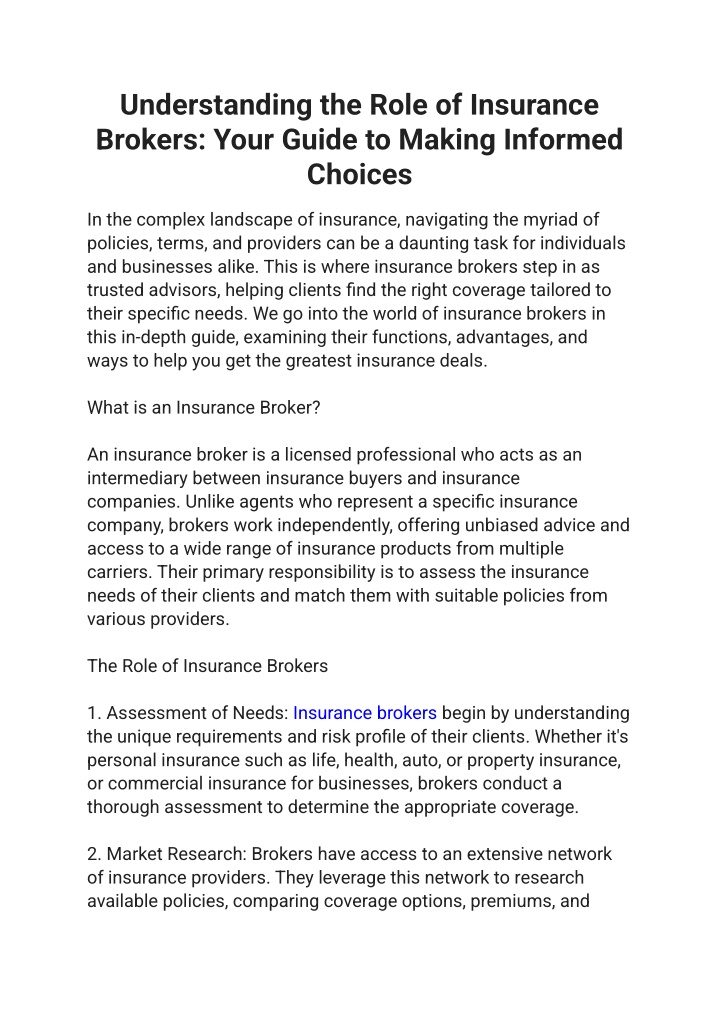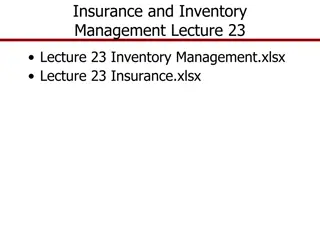
Understanding the Role of Insurance Brokers
In the complex landscape of insurance, navigating the myriad of policies, terms, and providers can be a daunting task for individuals and businesses alike. This is where insurance brokers step in as trusted advisors, helping clients find the right coverage tailored to their specific needs. We go into the world of insurance brokers in this in-depth guide, examining their functions, advantages, and ways to help you get the greatest insurance deals.
Download Presentation

Please find below an Image/Link to download the presentation.
The content on the website is provided AS IS for your information and personal use only. It may not be sold, licensed, or shared on other websites without obtaining consent from the author. If you encounter any issues during the download, it is possible that the publisher has removed the file from their server.
You are allowed to download the files provided on this website for personal or commercial use, subject to the condition that they are used lawfully. All files are the property of their respective owners.
The content on the website is provided AS IS for your information and personal use only. It may not be sold, licensed, or shared on other websites without obtaining consent from the author.
E N D
Presentation Transcript
Understanding the Role of Insurance Brokers: Your Guide to Making Informed Choices In the complex landscape of insurance, navigating the myriad of policies, terms, and providers can be a daunting task for individuals and businesses alike. This is where insurance brokers step in as trusted advisors, helping clients find the right coverage tailored to their specific needs. We go into the world of insurance brokers in this in-depth guide, examining their functions, advantages, and ways to help you get the greatest insurance deals. What is an Insurance Broker? An insurance broker is a licensed professional who acts as an intermediary between insurance buyers and insurance companies.Unlike agents who represent a specific insurance company, brokers work independently, offering unbiased advice and access to a wide range of insurance products from multiple carriers. Their primary responsibility is to assess the insurance needs of their clients and match them with suitable policies from various providers. The Role of Insurance Brokers 1. Assessment of Needs:Insurance brokersbegin by understanding the unique requirements and risk profile of their clients. Whether it's personal insurance such as life, health, auto, or property insurance, or commercial insurance for businesses, brokers conduct a thorough assessment to determine the appropriate coverage. 2. Market Research: Brokers have access to an extensive network of insurance providers. They leverage this network to research available policies, comparing coverage options, premiums, and
terms from different companies. This allows clients to make informed decisions and obtain the most competitive rates. 3. Tailored Solutions: One of the key advantages of working with an insurance broker is the personalized service they provide. Instead of offering one-size-fits-all solutions, brokers tailor insurance packages to meet the specific needs and budget constraints of their clients. This customization ensures that clients receive comprehensive coverage without paying for unnecessary features. 4. Policy Management: Brokers assist clients throughout the entire insurance process, from policy selection to claims assistance. They help clients understand the terms and conditions of their policies, manage renewals, and make adjustments as needed. In the event of a claim, brokers advocate on behalf of their clients, ensuring timely processing and resolution. 5. Risk Management: Beyond simply selling insurance, brokers play a crucial role in risk management. They advise clients on strategies to mitigate risks and minimize exposure to potential losses. This may involve implementing safety protocols, recommending additional coverage options, or modifying existing policies to better align with changing circumstances. Benefits of Using an Insurance Broker 1. Expert Advice: With their in-depth knowledge of the insurance market, brokers offer expert advice tailored to the individual needs of their clients. Whether you're a first-time buyer or a seasoned business owner, brokers provide valuable insights and guidance to help you make informed decisions. 2. Time and Effort Savings: Shopping for insurance can be time- consuming and overwhelming. By outsourcing this task to a broker, clients save time and effort while ensuring access to the best
available options. Brokers handle the research, paperwork, and negotiations, allowing clients to focus on their core responsibilities. 3. Access to Multiple Carriers: Unlike captive agents who represent a single insurance company, brokers have access to a diverse portfolio of carriers. This access enables brokers to offer a broader range of products and find policies that are best suited to their clients' needs and budget. 4. Risk Mitigation: By proactively identifying and addressing potential risks, brokers help clients safeguard their assets and livelihoods. Whether it's protecting against property damage, liability claims, or unforeseen events, brokers develop comprehensive risk management strategies to minimize exposure and ensure financial security. 5. Advocacy and Support: In the event of a claim, having an experienced advocate on your side can make all the difference. Brokers advocate on behalf of their clients, liaising with insurance companies and facilitating the claims process to ensure fair and prompt resolution. This advocacy provides peace of mind and reassurance during challenging times. Choosing the Right Insurance Broker When selecting an insurance broker, it's essential to consider factors such as experience, expertise, reputation, and customer service. The following advice will assist you in selecting the best broker: 1. Credentials and Licensing: Ensure that the broker is licensed and registered with the relevant regulatory authorities. Look for certifications such as Chartered Insurance Professional (CIP) or Certified Insurance Broker (CIB) which demonstrate expertise and professionalism.
2. Industry Experience: Seek out brokers with experience in your specific industry or niche. Whether you're a homeowner, small business owner, or corporate executive, working with a broker who understands the intricacies of your industry can be advantageous. 3. Reputation and Reviews: Research the broker's reputation by reading client testimonials, reviews, and ratings online. A reputable broker will have a track record of satisfied clients and positive feedback. 4. Communication and Accessibility: Choose a broker who is accessible, responsive, and communicative. Effective communication is essential for building trust and ensuring that your needs are met promptly and efficiently. 5. Fee Structure: Understand how the broker is compensated and ensure transparency regarding fees and commissions. Brokers may be compensated through commissions from insurance companies, fees paid by clients, or a combination of both. Make the cost schedule clear up front to prevent any unpleasant surprises. Conclusion In a complex and ever-changing insurance landscape, insurance brokers play a vital role in helping individuals and businesses navigate the myriad of options and secure the right coverage. By offering expert advice, access to multiple carriers, personalized service, and ongoing support, brokers empower clients to make informed decisions and protect what matters most. When choosing an insurance broker, prioritize experience, expertise, reputation, and communication to ensure a seamless and rewarding partnership. With the guidance of a trusted broker, you can navigate the complexities of insurance with confidence and peace of mind.






















